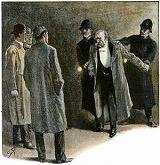We had all risen to our feet, our prisoner breathing hard, with a stalwart constable on each side of him. Already a few loiterers had begun to collect in the street. Holmes stepped up to the window, closed it, and dropped the blinds. Lestrade had produced two candles, and the policemen had uncovered their lanterns. I was able at last to have a good look at our prisoner.
It was a tremendously virile and yet sinister face which was turned towards us. With the brow of a philosopher above and the jaw of a sensualist below, the man must have started with great capacities for good or for evil. But one could not look upon his cruel blue eyes, with their drooping, cynical lids, or upon the fierce, aggressive nose and the threatening, deep-lined brow, without reading Nature’s plainest danger-signals. He took no heed of any of us, but his eyes were fixed upon Holmes’s face with an expression in which hatred and amazement were equally blended. “You fiend!” he kept on muttering. “You clever, clever fiend!”
“Ah, Colonel!” said Holmes, arranging his rumpled collar. “‘Journeys end in lovers’ meetings,’ as the old play says. I don’t think I have had the pleasure of seeing you since you favoured me with those attentions as I lay on the ledge above the Reichenbach Fall.”
The colonel still stared at my friend like a man in a trance. “You cunning, cunning fiend!” was all that he could say.
“I have not introduced you yet,” said Holmes. “This, gentlemen, is Colonel Sebastian Moran, once of Her Majesty’s Indian Army, and the best heavy-game shot that our Eastern Empire has ever produced. I believe I am correct, Colonel, in saying that your bag of tigers still remains unrivalled?”
The fierce old man said nothing, but still glared at my companion. With his savage eyes and bristling moustache he was wonderfully like a tiger himself.
“I wonder that my very simple stratagem could deceive so old a shikari,” said Holmes. “It must be very familiar to you. Have you not tethered a young kid under a tree, lain above it with your rifle, and waited for the bait to bring up your tiger? This empty house is my tree, and you are my tiger. You have possibly had other guns in reserve in case there should be several tigers, or in the unlikely supposition of your own aim failing you. These,” he pointed around, “are my other guns. The parallel is exact.”

Colonel Moran sprang forward with a snarl of rage, but the constables dragged him back. The fury upon his face was terrible to look at.
“I confess that you had one small surprise for me,” said Holmes. “I did not anticipate that you would yourself make use of this empty house and this convenient front window. I had imagined you as operating from the street, where my friend Lestrade and his merry men were awaiting you. With that exception, all has gone as I expected.”
Colonel Moran turned to the official detective.
“You may or may not have just cause for arresting me,” said he, “but at least there can be no reason why I should submit to the gibes of this person. If I am in the hands of the law, let things be done in a legal way.”
“Well, that’s reasonable enough,” said Lestrade. “Nothing further you have to say, Mr. Holmes, before we go?”
Holmes had picked up the powerful air-gun from the floor, and was examining its mechanism.
“An admirable and unique weapon,” said he, “noiseless and of tremendous power: I knew Von Herder, the blind German mechanic, who constructed it to the order of the late Professor Moriarty. For years I have been aware of its existence, though I have never before had the opportunity of handling it. I commend it very specially to your attention, Lestrade, and also the bullets which fit it.”